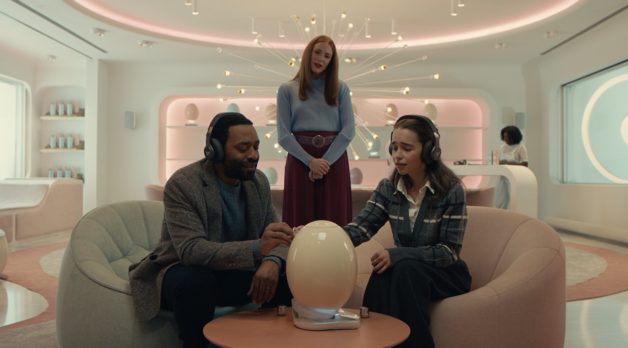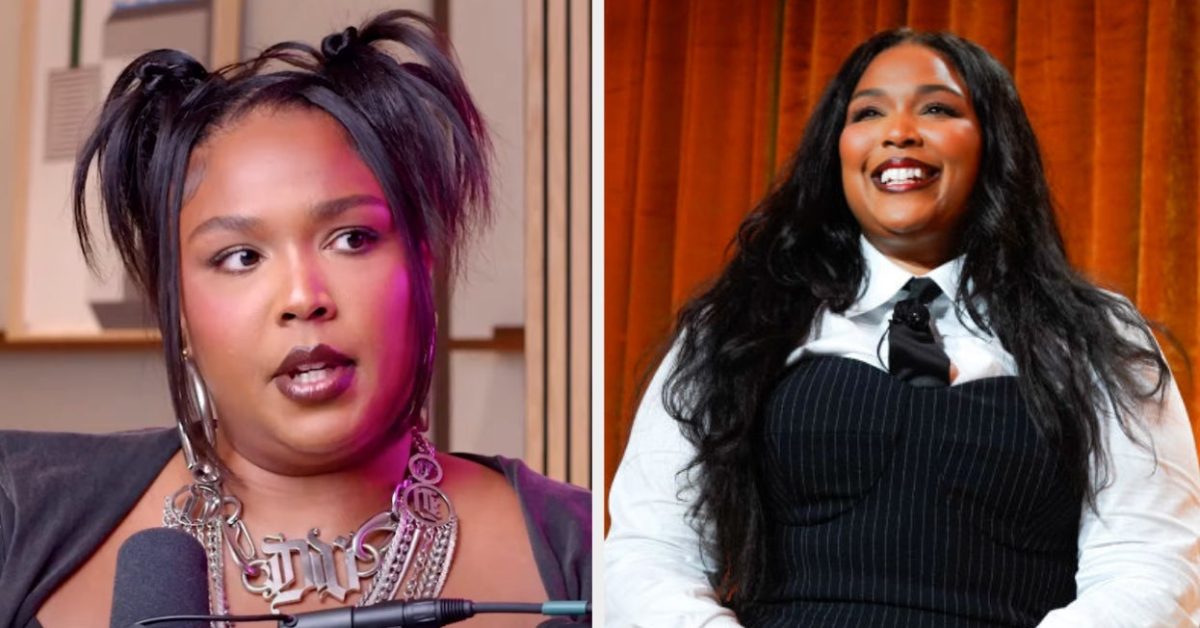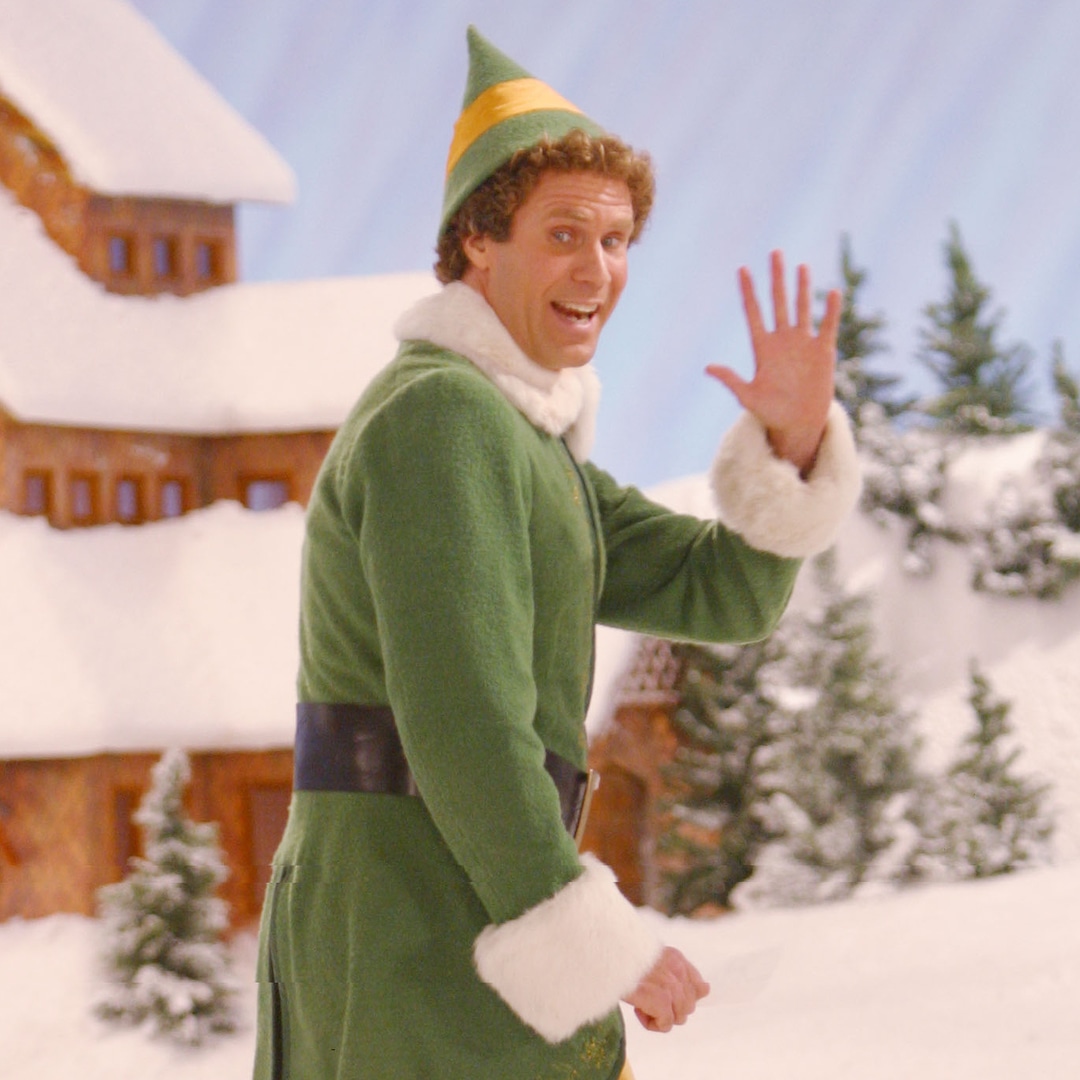
“With This Film, It Came Full Circle”: Editor Ron Patane on The Pod Generation
Jan 21, 2023
The Pod Generation. Photo credit: Andrij Parekh, courtesy of Sundance Institute.
In The Pod Generation, the third feature film from French-American director Sophie Barthes, the process of pregnancy and birth has been offloaded from human bodies, relegated to artificial pods that produce fetuses. New York-based couple Rachel and Alvy (Emilia Clarke and Chiwetel Ejiofor) are excited to learn that they’ve been selected to attend the ultra-exclusive Womb Center, where these quasi-artificial offspring are conceived. However, even within the confines of this futuristic world, technologies of convenience must be questioned and contended with.
Editor Ron Patane discusses his initial excitement at the prospect of working on the film, aspects of The Pod Generation that changed and shifted during the edit and the effectiveness of the film’s satire.
See all responses to our annual Sundance editor interviews here.
Filmmaker: How and why did you wind up being the editor of your film? What were the factors and attributes that led to your being hired for this job?
Patane: Sophie had been editing with Olivier in Europe, and when he could not continue on the project, she needed to find someone to complete the film in the U.S. I had met Sophie originally through her husband, Andrij Parek, who shot Blue Valentine for Derek Cianfrance, though we didn’t really know each other well. So when my agent told me about the possibility of working on the film with them, I was immediately interested, having been a fan of Cold Souls. After reading the script, I was excited because I thought the writing was really smart and funny. I agreed with all of the satire in it and the way it viewed technology as something which holds promise for us, but actually undermines our humanity and agency in an absurd way. It helped that we were sort of from the same circle of filmmakers in New York. There was probably more trust than there might have been otherwise because of that. I think Sophie felt my sensibilities could help take the film where she wanted it to go. I was really thankful for the opportunity and it was a great experience. Sophie definitely has a voice and I was happy to put my efforts in service of that voice.
Filmmaker: In terms of advancing your film from its earliest assembly to your final cut, what were your goals as an editor? What elements of the film did you want to enhance, or preserve, or tease out or totally reshape?
Patane: In this case, since I was inheriting an existing cut, there was a clear sense of what we were trying to do with it. I felt from my first viewing that the humor was really working, and the world building as well. Those things were pretty baked into the script and the production design, cinematography and performance were all working together to make those elements strong. However, the narrative structure wasn’t totally clicking yet, and the point of the view needed to strike a better balance between Rachel and Alvy. Also, we needed to connect with Rachel a little more emotionally and understand what she was dealing with as she navigates the decisions she makes and the consequences of them.
Filmmaker: How did you achieve these goals? What types of editing techniques, or processes, or feedback screenings allowed this work to occur?
Patane: One thing that I felt we needed to do was to structure the dream sequences in the film in a way that gives us the best window into Rachel’s inner world. The character was written as fairly ambivalent, as if the people around her and life itself were kind of pushing her to make certain choices in her life. So the dreams were one of the few things we had to use as a window into her. We also went back through Emila’s takes to make sure we were using the material that best allowed us to relate to her and project onto her a bit. There were also some passages of the film that felt a little out of balance, like when Alvy connects with the pod. Rachel seemed to disappear a bit, so we needed to cross cut some of the montages to make sure we were always balancing the perspectives. Another challenge was trying to get the tone right. This is where feedback from screenings was very helpful. The film has some very serious things to say about technology, parenting and the where the world is heading, and yet it’s a very funny satire. So sometimes the audience wasn’t sure how serious they were supposed to be taking what was happening to this couple. Probably some people still feel that way about the film, but for others the tone was really working perfectly.
But it was clear we had to calibrate that somehow. So we really focused on each scene of the film using sound, performance, music, everything at our disposal, to shape how much the film was telegraphing humor, drama, gravitas, etc. Using older songs that played against the technological world we were seeing became a great tool for lightening the mood and moving away from the score at times, so when we needed the emotion of the score it would be more effective. We also worked with the composers (The Galperine brothers, Evgueni and Sacha) to make sure the score was riding a fine line between the satire and the drama of the film. And they did a great job as usual of finding the right balance.
There were some difficult choices along the way. I had built one sequence that cross cut the worlds of Rachel and Alvy and really highlighted some of the distance between their experiences, as Alvy is connecting to the pod and Rachel is feeling alienated by technology and work. It was quite poignant, but it was sort of one montage too many and I just felt it was tipping the balance of the film into a place that was too serious for the satire. Hopefully we made the right choice!
Filmmaker: As an editor, how did you come up in the business, and what influences have affected your work?
Patane: I could probably write a book on this one day, but I’ll keep it short here. I didn’t go to film school, but moved to NYC shortly after college and started working in post. I had a love for movies, music, photography, literature and art in general. Filmmaking seemed like a natural way to incorporate all of it. I was lucky enough to cross paths with Derek Cianfrance (and my co-editor on his stuff, Jim Helton) early in my freelance editing career. We connected and I was fortunate enough to start this journey I’ve been on with them for over 20 years now. But Blue Valentine was really the opportunity that allowed me to work on films, which was a dream come true. And funny enough, that’s where I first met Andrij. So with this film, it came full circle. But I really learned the craft of editing simply by doing it, first on doc material, as well as commercials and music videos, and then later films.
As far as influences go, there’s too many to mention. But I can say that it was probably discovering Kubrick in high school that really got me interested in filmmaking and how these things were made. When I was younger I had books on ILM and would geek out on that kind of thing, but seeing A Clockwork Orange opened up a whole new world. It was like, “What is this?!” It was a film that was operating on a whole different level. Later, I kind of fell in love with Wong Kar-wai and a totally different kind of cinema, that was a far cry from the cold calculation of Kubrick: A free-form, romantic love song kind of cinema, heavily influenced by French New Wave. There’s been all sorts of other things along the way, but those two diametrically opposed examples stand out from a formative stand point.
Filmmaker: What editing system did you use, and why?
Patane: I’ve used Avid Media Composer ever since moving away from Final Cut Pro, which was what I came up on. After they overhauled it, I needed to switch to something else and Media Composer was the industry standard. It just seemed to make sense and I’ve been on it ever since. Though I have used Premiere from time to time as well. For the work flow and integrating work between departments, it just makes a lot of sense.
Filmmaker: What was the most difficult scene to cut and why? And how did you do it?
Patane: There were a few tough ones. But I think the scene where Rachel first tells Alvy that she went to the Womb Center was maybe the toughest. Only because we kept coming back to it to reassess how dramatic that conversation should seem. First, I had to kind of reinvent the beginning and find an efficient way to get into it. There was a whole opening section that was played for comedy but was hurting the flow. Then we had to carefully choose the right performances and delicately excise the parts that seemed too dramatic. That can be tricky in a scene where the blocking is changing and you can’t as easily remove something. So it was a careful sculpting that we were doing to find the right tone and balance. The first cut I saw of the film had excluded that scene because it felt too serious. But the movie really needed it. You need to see them broach the topic and for Rachel to admit she handled it the wrong way. It humanized her. And then we could undercut that with her final line and going to the absurdity of visiting their friends house where Alvy is stuck listening to Alice’s feminist rant. It was a lot of small moves and micro-editing, but I think in the end it landed in the right place.
Filmmaker: What role did VFX work, or compositing, or other post-production techniques play in terms of the final edit?
Patane: There’s always the occasional split screen or other invisible stuff I might do to make things work. But in this case, the VFX were integral to some sequences. For instance, when Rachel visits her AI therapist, Eliza. In the beginning, we were editing these scenes with no temp VFX because we hadn’t received any elements yet. So we were just imagining what the eye would be doing when we cut to it. The same goes for the Mashas in the film, the digital executive assistants. But once we started seeing some examples of the fantastic work that Benuts was going to deliver on these characters, it changed some of the edits. Once we could understand the humor that we could get out of what Eliza’s eye was expressing, we were able to improve the scenes by leaning into that. So that was a fun collaboration to find those opportunities. Then there’s the sound side, where the film won the Dolby grant and was able to receive an Atmos mix, which really made the dreams and nature sequences more immersive and visceral.
Filmmaker: Finally, now that the process is over, what new meanings has the film taken on for you? What did you discover in the footage that you might not have seen initially, and how does your final understanding of the film differ from the understanding that you began with?
Patane: That’s a tough question. I think the satire of the film is fairly clear in what it’s trying to say, and I immediately connected with it, as I’ve said. But the film is also dealing with a lot of complicated issues regarding maternity, gender parity, the runaway train of technological progress, corporate overlords and our relationship to nature. There’s a lot to unpack, so I feel like you can go back to the film and look at it from any of these angles and see something new, or make a new discovery of your own. Regarding the footage, I wish I had an opportunity to watch every frame. Because I came on later, I didn’t have the chance to see every take of every scene. But I would always discover great performance moments from Emilia and Chiwetel that were either really sweet or funny, even though sometimes they weren’t right for the scene or moment. Those are always nice to discover because in the end they are just for the filmmakers, no one else will get to see them.
Publisher: Source link
"All Of This Came Out Of Nowhere": Lizzo Publicly Responds To Sexual Harassment Lawsuits After Being Dismissed From A Case
"We're continuing to fight the other claims."View Entire Post › Disclaimer: This story is auto-aggregated by a computer program and has not been created or edited by filmibee.Publisher: Source link
Dec 27, 2024
This Fan-Favorite Elf Quote Almost Didn’t Make It Into the Film
11. Determined to maintain the old school aesthetic, Favreau told Rolling Stone he didn’t want to make the film “a big CGI extravaganza," only using the technology to add some snow. “I like motion-control, models, matte paintings,” he explained. “It…
Dec 27, 2024
Guess The Missing Word: Christmas Song Titles
The holidays are here, and there's no better way to ring it all in than a seasonal song or two. So test your yuletide knowledge by identifying the missing word in the 14 holiday songs below. Good luck! Disclaimer: The…
Dec 26, 2024
Score an Extra 40% off Fashion & More
Our writers and editors independently determine what we cover and recommend. When you buy through our links, E! may earn a commission. Learn more. Even on Christmas Day, Anthropologie has your back with an extra 40% off sale that’s practically a…
Dec 26, 2024











